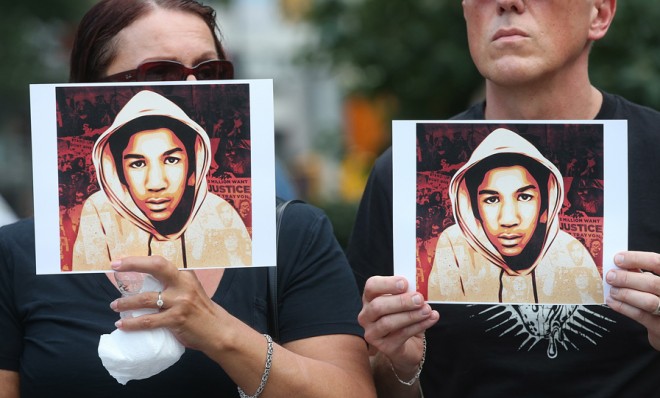How do we prevent the death of the next Trayvon Martin?
Enacting tougher gun laws is hard enough. Changing attitudes on race is even harder

A free daily email with the biggest news stories of the day – and the best features from TheWeek.com
You are now subscribed
Your newsletter sign-up was successful
Say what you will about the jury's decision to acquit George Zimmerman, the fact remains that Trayvon Martin, an unarmed, 17-year-old teenager, is dead. He was doing what many teen boys do every day — buying candy from a 7-Eleven — before he was shot by a 28-year-old adult in a gated community.
Martin is not the first unarmed young black man to be shot dead, and, sadly, he almost certainly won't be the last. The Zimmerman trial coincided with the release of Fruitvale Station, a film based on the 2009 shooting of Oscar Grant, an unarmed 22-year-old who was hand-cuffed, face-down, when an Oakland transit agency police officer pulled out his gun and killed him.
Zimmerman will serve no jail time, and could even get the handgun he used in the shooting back from authorities. Johannes Mehserle, the officer who shot Grant, was found guilty of involuntary manslaughter, served 11 months in prison, and is out on parole.
The Week
Escape your echo chamber. Get the facts behind the news, plus analysis from multiple perspectives.

Sign up for The Week's Free Newsletters
From our morning news briefing to a weekly Good News Newsletter, get the best of The Week delivered directly to your inbox.
From our morning news briefing to a weekly Good News Newsletter, get the best of The Week delivered directly to your inbox.
In the wake of the Zimmerman verdict, President Obama released a statement saying, "We should ask ourselves, as individuals and as a society, how we can prevent future tragedies like this."
So how, exactly, can we do that?
Certainly, gun laws are a factor. Progressives have pointed to Florida's expansive Stand Your Ground laws, which allow you to shoot somebody on public property if you reasonably feel at risk of death or bodily harm, a vague standard prosecutors have complained has made it harder to put armed perpetrators behind bars.
"Effectively, I can bait you into a fight and if I start losing I can can legally kill you, provided I 'believe' myself to be subject to 'great bodily harm,'" writes The Atlantic's Ta-Nehisi Coates. "It is then the state's job to prove — beyond a reasonable doubt — that I either did not actually fear for my life, or my fear was unreasonable."
A free daily email with the biggest news stories of the day – and the best features from TheWeek.com
Proving that Zimmerman's fear was unreasonable was difficult because the only other witness, Martin, was dead. Using fear of bodily harm as a legal justification for shooting someone is also tricky in a country where a certain portion of the population believes that young black men are dangerous.
"It is a complicated thing to be young, black, and male in America," writes Gawker's Cord Jefferson, adding:
Not only are you well aware that many people are afraid of you — you can see them clutching their purses or stiffening in their subway seats when you sit across from them — you must also remain conscious of the fact that people expect you to be apologetic for their fear.
If you’re a black man and you don’t remain vigilant of and obsequious to white people’s panic in your presence …. then you must be prepared to be arrested, be beaten, be shot through the heart and lung and die on the way home to watch a basketball game with your family. [Gawker]
The simple, terrible truth is that while gun laws can be changed, people's attitudes on race are a different matter. Clutching a purse tightly when a young black man enters the subway isn't illegal, nor should it be. But the culture of fear it's indicative of has very real consequences.
"As much as I have written and advocated for reducing the number of and access to guns, it wasn’t just the gun in Zimmerman’s hand that shot Trayvon," writes The Nation's Mychal Denzel Smith. "It was a historic rendering of black men as enemies of the state, menaces to society, threats to the American way of life, that caused Trayvon to lose his life that day. How do you legislate against that?"
Keith Wagstaff is a staff writer at TheWeek.com covering politics and current events. He has previously written for such publications as TIME, Details, VICE, and the Village Voice.
-
 Buddhist monks’ US walk for peace
Buddhist monks’ US walk for peaceUnder the Radar Crowds have turned out on the roads from California to Washington and ‘millions are finding hope in their journey’
-
 American universities are losing ground to their foreign counterparts
American universities are losing ground to their foreign counterpartsThe Explainer While Harvard is still near the top, other colleges have slipped
-
 How to navigate dating apps to find ‘the one’
How to navigate dating apps to find ‘the one’The Week Recommends Put an end to endless swiping and make real romantic connections